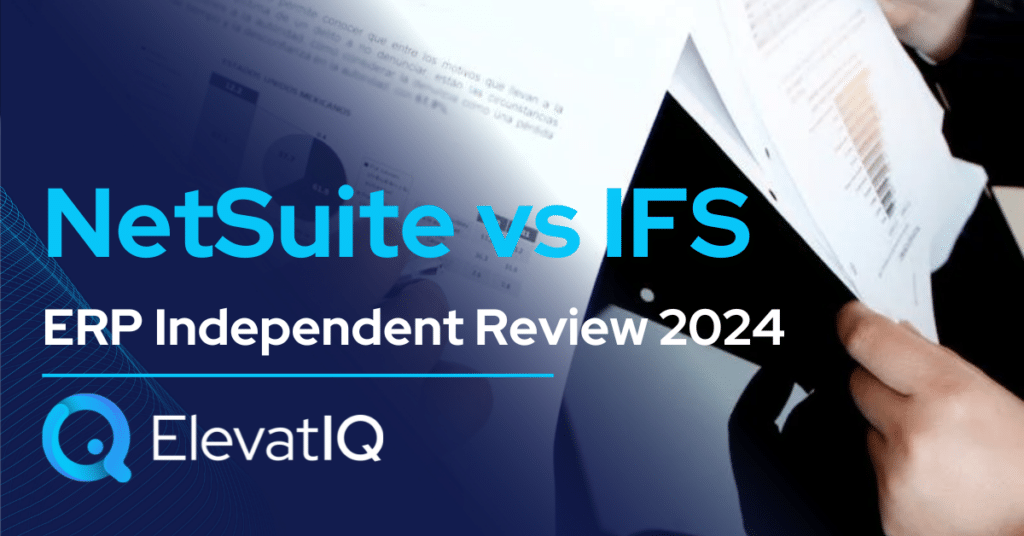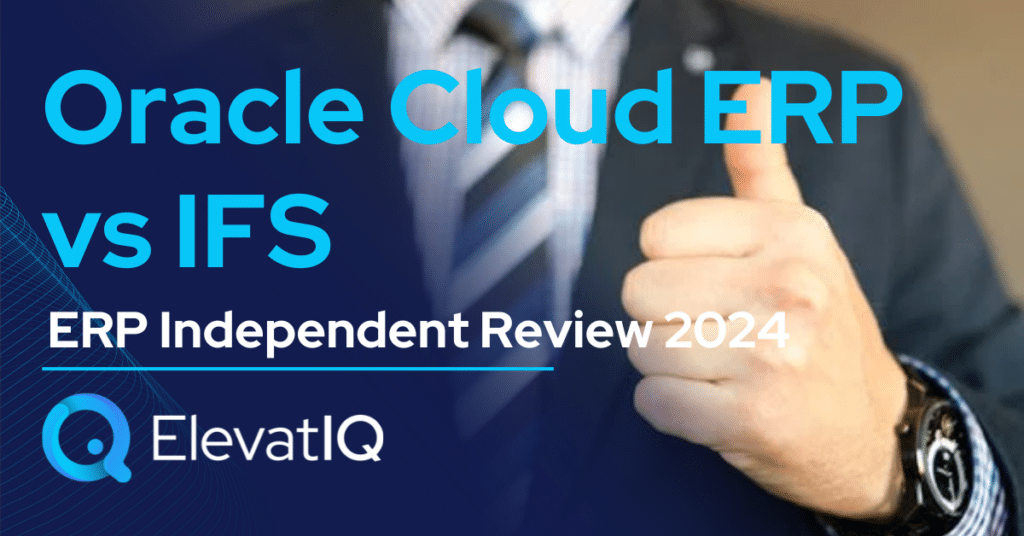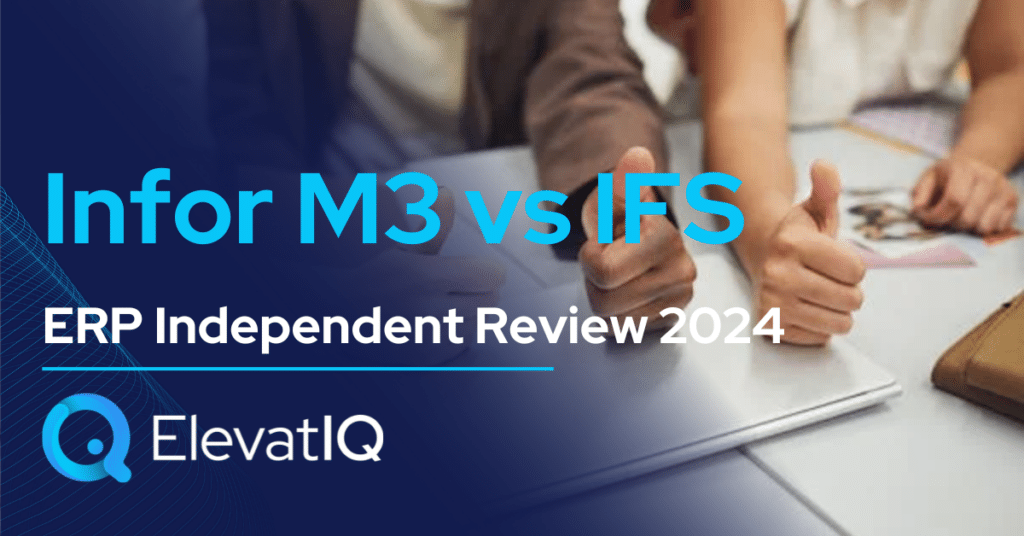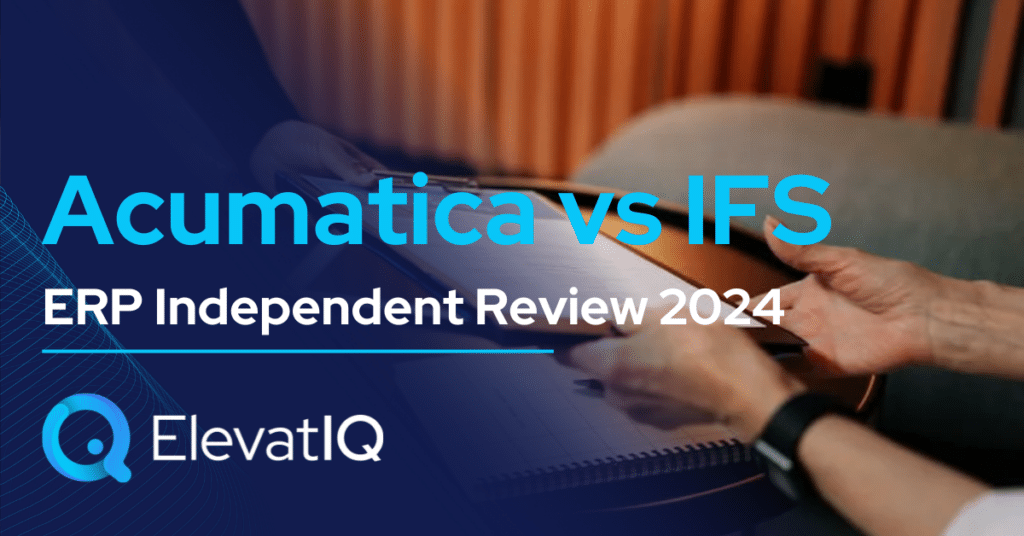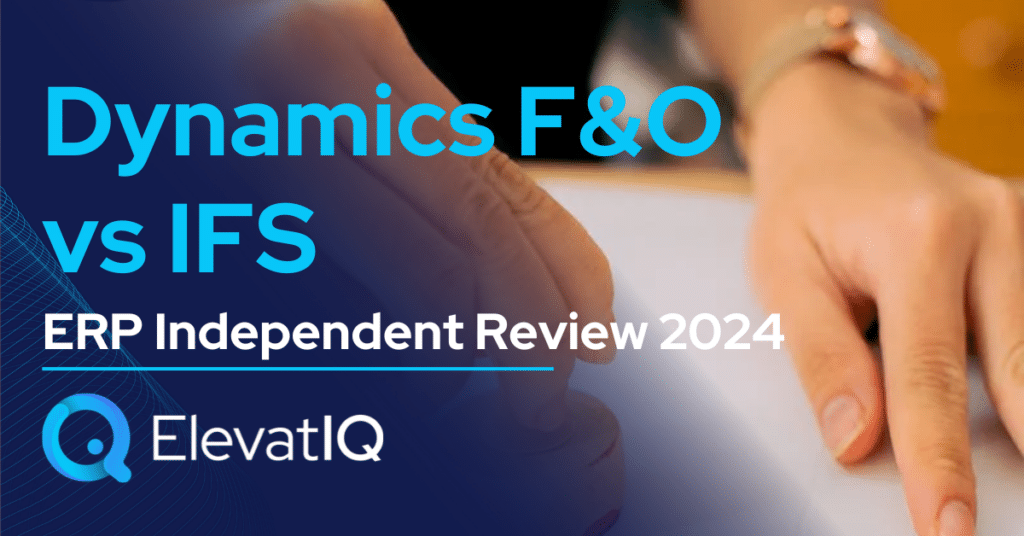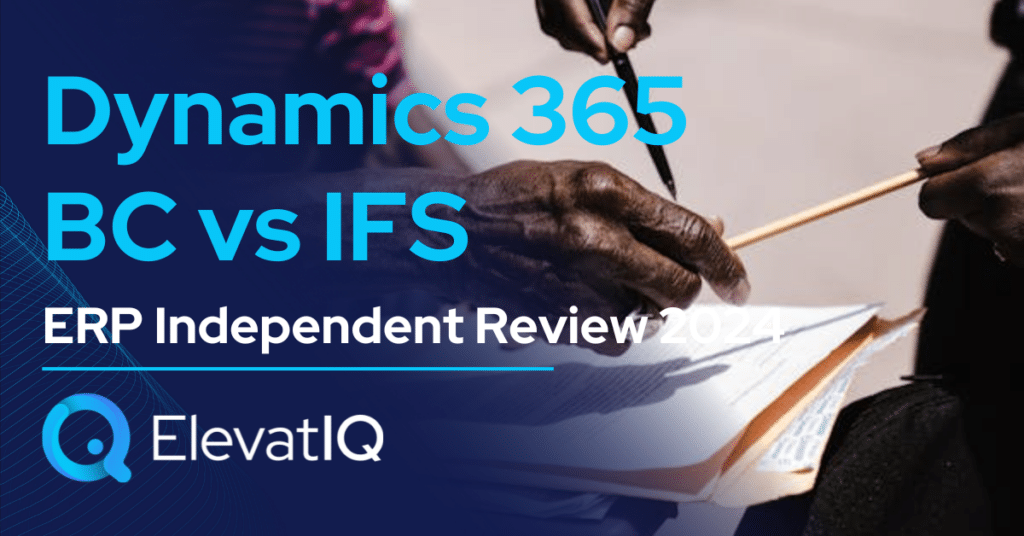NetSuite caters well particularly to globally spread small to mid-market companies seeking robust financial capabilities with localization in numerous countries. It also offers solutions tailored to specific business models. On the other hand, similar to other upper mid-market ERP solutions like Infor LN, QAD, or Sage X3, IFS boasts extensive functionality tailored for companies heavy in asset and field service operations. NetSuite targets companies particularly from $10M-$1B in revenue with global presence and need for stronger financial capabilities. Whereas, IFS is positioned for companies within the $100M – $1B revenue range, with a significant portion nearing the $1B mark.
NetSuite is suitable for a diverse range of companies, including service-centric, distribution-centric, commerce-centric, and B2C organizations. It also performs well across various industries but may lack depth for industrial distributors and manufacturers, focusing more on lighter manufacturing and consumerized products like health and beauty, fashion, apparel, and CPG. On the other hand, IFS boasts robust global, multi-entity capabilities and operates as a cloud-native solution. IFS not only delivers functional capabilities but also efficiently manages the transactional workload of upper-mid-market companies.
With robust financial capabilities and an integrated HCM solution, NetSuite is well-suited for service-centric industries, including smaller banks, credit unions, financial services, non-profit organizations, and the technology and media sectors. On the other hand, IFS appeals to enterprises seeking mature, industry-specific capabilities, reducing the need for extensive development with vanilla ERP systems like SAP or Oracle. Therefore, choosing between NetSuite vs IFS requires a detailed examination, and this comparison offers valuable insights for ERP selection projects. Let’s delve deeper into the specifics.
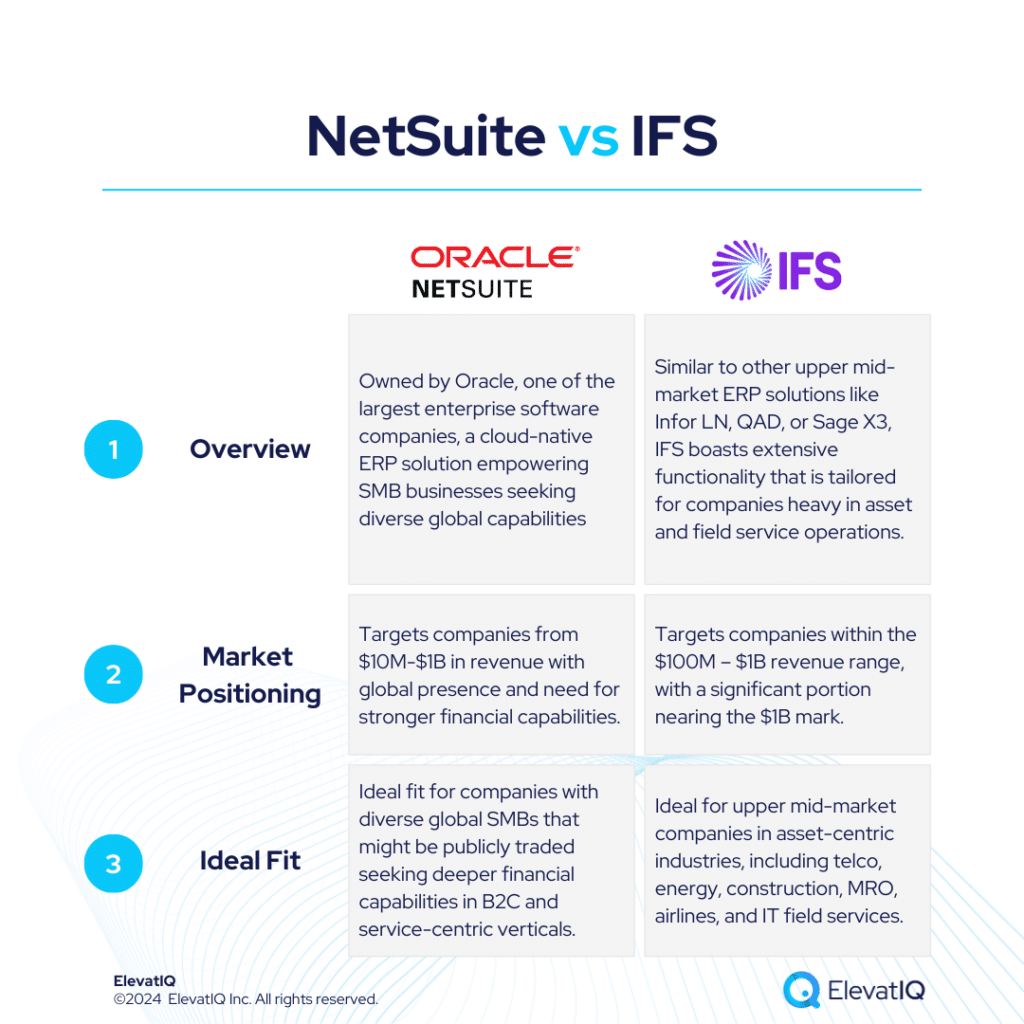

| NetSuite | IFS | |
| Started in | 1998 | 1986 |
| Ownership by | Oracle in 2016 | EQT |
| No. of customers | 37,000+ | 6,500+ |
What is NetSuite?
NetSuite stands out as the leading ERP solution, driven by its success particularly for diverse industries seeking stronger financial capabilities over the operational, robust ecosystem, credible marketplace add-ons, and comprehensive functionality. Not as complex as some competitors like SAP S/4 HANA and Microsoft F&O, NetSuite also excels in supporting diverse business models, including omnichannel architecture, matrix/dimensional inventory, and subscription-based models.
While NetSuite excels across industries, it may not be the ideal choice for industrial distributors and manufacturers due to limitations in pricing and item master capabilities. Its strength lies in supporting lighter manufacturing and also consumerized products like health and beauty, fashion, apparel, and CPG. With robust financial capabilities and an integrated HCM solution, NetSuite is well-suited for service-centric industries, including smaller banks, credit unions, financial services, non-profit organizations, as well as the technology and media sectors.
While NetSuite remains the top-ranked solution due to its product quality, there might be challenges with over-customization and integration issues, leading to implementation failures. Working with NetSuite also demands thorough vetting of their solution and architecture.
What Is IFS?
Similar to other upper mid-market ERP solutions like Infor LN, QAD, or Sage X3, IFS also boasts extensive functionality. This functionality is particularly tailored for companies heavy in asset and field service operations. Positioned uniquely in the market, IFS also appeals to enterprises seeking mature, industry-specific capabilities, reducing the need for extensive development with vanilla ERP systems like SAP or Oracle. IFS serves as an optimal alternative particularly in the upper mid-market space, offering standalone best-of-breed asset management and field service capabilities or a comprehensive ERP solution meticulously crafted for asset-centric industries, including telco, energy, construction, MRO, airlines, and IT field services.
The IFS data model also surpasses the complexity of smaller systems like Acumatica or NetSuite, demanding an experienced internal team and external advisory support to successfully align process and data codings with the intricate IFS data model. It is an ideal choice for upper mid-market companies outgrowing smaller systems, such as Acumatica or NetSuite, and requiring mature capabilities for enterprise-wide asset scheduling and maintenance. IFS not only delivers functional capabilities but also efficiently manages the transactional workload of upper-mid-market companies.
IFS boasts robust global, multi-entity capabilities and operates as a cloud-native solution. The majority of IFS customers fall within the $100M – $1B revenue range, with a significant portion nearing the $1B mark. While IFS has its roots in Europe, they have been trying to grow its presence in North America. In 2023, IFS made strategic acquisitions to enhance its AI and shop floor capabilities.
NetSuite vs IFS Comparison
Navigating the choice between NetSuite vs IFS is a significant decision for businesses particularly looking for operational efficiency and strategic alignment. Thus, this section delves into the comprehensive comparison of NetSuite vs IFS across various critical dimensions.
| NetSuite | IFS | |
| Global Operational Capabilities | Natively localized in over 100 countries. | Has robust global multi-entity capabilities. |
| Diverse Capabilities | Supports diverse business models across multiple countries. | Companies with a diverse business model, such as manufacturing or expecting changes with the model, might struggle. |
| Best-of-breed Capabilities | Contains pre-integrated components like HCM and FP&A, though the maturity of these components may vary. | Has one of the strongest field service and asset management capabilities. |
| Last-mile Capabilities | Limited last-mile capabilities, especially for manufacturing. | Often require add-ons for specific micro-verticals. |
| Operational Functionalities | Richer financial capabilities over operational features. | The operational capabilities would be deeper in some areas, making it a best-of-breed option for enterprise-grade asset and field service-centric use cases used alongside another ERP as a corporate ledger. |
| Integration Capabilities | Offers several pre-integrated solutions with more options from Celigo. | Good fit for those seeking best-of-breed field service capabilities for a subsidiary or integrated with a corporate financial ledger. |
| Manufacturing Capabilities | Limited BOM layers for assembly-centric operations, requiring additional add-ons. | Has comparatively limited manufacturing capabilities. |
| Pricing Model | Named-user based with inflexible long-term contracts. | Recurring subscription-based model. |
| Key Modules | 1. Financial Management 2. Accounting 3. Global Business Management 4. Inventory Management 5. Order Management 6. Supply Chain Management 7. Warehouse Management 8. Procurement 9. Customer Relationship Management | 1. Manufacturing 2. Supply Chain Management 3. Projects 4. Finance 5. Human Capital Management 6. Procurement 7. Customer Relationship Management 8. Commerce |
NetSuite vs IFS Feature Comparison
Both platforms offer a plethora of features and functionalities designed to streamline business operations and enhance efficiency. In this feature comparison, we delve into particularly the distinct capabilities of NetSuite vs IFS across various critical dimensions, providing insights to aid businesses in making informed decisions regarding their ERP selection. Thus, this section discusses features under each of the following modules, particularly financial management, and supply chain management.
Financial Management Comparison
In this section, we are discussing a detailed comparison of the financial management capabilities particularly offered by NetSuite vs IFS. By examining their respective strengths and functionalities, particularly in managing financial processes. Businesses can therefore gain valuable insights to determine the best-suited ERP solution for their financial management needs.
| NetSuite | Epicor Kinetic | ||
| Financial Management | General Ledger | Supports complex general ledgers including public reporting requirements of several countries. | Centralizes financial data management, enabling accounting, reporting, and analysis. |
| Accounts Receivable and Accounts Payable | Automates and streamlines invoice delivery, payment processing, and collections management as well as accounts payable processes. | Streamlines customer invoicing, payment processes, vendor invoices and payments. | |
| Cash Flow Management | Provides visibility to optimize cash flows, monitor bank accounts, and manage liquidity. | Enables accurate planning and forecasting of cash activities, and analyze liquidity and cash positions. | |
| Tax Management | Manages domestic and global tax, generates detailed reports, and analyzes transactions real-time. | Automates and manages tax calculations, compliance, and reporting across multiple jurisdictions. |
Supply Chain Management Comparison
In this comparison, we explore and analyze the supply chain management capabilities of NetSuite vs IFS, shedding light particularly on their respective strengths and weaknesses.
| NetSuite | Epicor Kinetic | ||
| Supply Chain Management | Warehouse Management | Provides the ability to optimize day-to-day warehouse operations, eliminate manual processes and minimize handling costs. | Enables businesses to efficiently manage warehouse operations by automating the physical storage and retrieval of inventory items. |
| Service Management | Automates inventory management processes with multi-location fulfilment, cycle counting, replenishment, traceability and item visibility. | Enables organizations to efficiently manage their field service operations, including planning, scheduling, dispatching, and mobile workforce management. | |
| Inventory Management | Provides the ability to optimize day-to-day warehouse operations, eliminate manual processes and minimize handling costs. | Provides real-time visibility into stock movements, allowing businesses to maintain optimal inventory levels by setting reorder points and reducing the risk of overstocking and stock-outs. | |
| Procurement | Streamlines procurement processes with source management, purchase management, vendor management and invoice processing. | Streamlines the procurement process by automating the creation, tracking, and approval of purchase orders, ensuring efficient and accurate order fulfillment. | |
| Other Features | Supply Chain Planning – Provides the ability to analyze demand, determine replenishment requirements, add stock and create orders according to an up-to-date supply plan. | Sales Order Management – Efficiently handles the entire sales order process from quotation to invoicing, ensuring accurate order fulfillment and real-time tracking across multiple sites. | |
| Supply Chain Execution– Optimizes all supply chain assets, controls costs at each step. | Requisition Management – Simplifies the procurement process by allowing users to create, track, and approve requisitions, ensuring that all purchase requests are efficiently managed and fulfilled. |
Pros of NetSuite vs IFS
When evaluating ERP solutions, understanding the distinct advantages of NetSuite vs IFS is crucial. In this section, we are particularly exploring the strengths of NetSuite vs IFS across various dimensions. Thus, shedding light on their respective capabilities and functionalities.
| NetSuite | IFS |
| Provides richer financial capabilities over operational, with leaner operational layers built with the product compared to Epicor Kinetic. | One of the most consistent user experiences that have been rearchitected and also modernized. |
| Ideal for SMBs operating in different countries. | One of the strongest asset-management capabilities for organizations particularly with very thick asset and predictive maintenance needs. |
| The data model is B2C friendly, supporting integration with B2C channels. | Designed to handle large programs where consolidated visibility would be critical without ad-hoc arrangements. |
| Ideal for eCommerce-centric SMBs because of the ecosystem and the integration operations available for eCommerce-centric companies. | Unique financial workflows to support complex project manufacturing programs. |
Cons of NetSuite vs IFS
Just like recognizing strengths is important, it’s also crucial to weigh the specific drawbacks of NetSuite vs IFS. Therefore, in this section, we will delve into the limitations and challenges associated with NetSuite vs IFS across various operational and financial dimensions.
| NetSuite | IFS |
| Not a great value for companies operating only in a few countries. | Has a limited presence in North America and also a lean partner ecosystem. |
| May struggle with transactional workload requirements of companies over $1B and the ones that might be acquiring 10-20 entities every year. | Companies particularly with a diverse business model, might outgrow or struggle with the solution. |
| Not ideal for startups with simpler operating models. | Companies involved with the M&A or the ones part of the PE portfolio might not be the best fit for IFS. |
| Named-user-based pricing requires allocating fixed costs, even for seasonal workers or external users accessing the subset of data such as customer or vendor portals. | IFS might not be the best fit to be used particularly just as the corporate ledger for large project manufacturing enterprises. |
Conclusion
In conclusion, both NetSuite vs IFS present robust ERP solutions tailored to different business needs, making the choice between them highly dependent on a company’s industry and scale. NetSuite shines for SMBs seeking strong financial management, especially in service-centric industries with diverse global operations. Its ease of integration with other business functions and also support for a variety of business models, including B2C, makes it an ideal option for eCommerce, technology, and media companies. However, its operational functionality may not fully meet the needs of larger enterprises with complex asset-heavy requirements.
On the other hand, IFS is particularly strong for upper mid-market companies operating in asset-intensive sectors such as energy, telecommunications, and construction. Its deep functionality in asset management and field services positions it as a more comprehensive solution particularly for businesses that demand specialized industry capabilities. Although IFS excels in this niche, its limited presence in North America and narrower partner ecosystem may pose challenges for companies requiring more expansive operational reach.
Both systems have their strengths and limitations, so businesses should carefully evaluate their specific need. Also, seeking assistance from an independent ERP consultant can significantly aid the decision-making process. To get a 360-degree view of feature comparisons, it’s essential to explore not only NetSuite vs. IFS but also insights from other analyses such as NetSuite vs. Acumatica, SAP S/4 HANA, Oracle Cloud ERP, Dynamics F&O, Dynamics 365 BC, Infor LN, Infor M3, and Epicor Kinetic.



